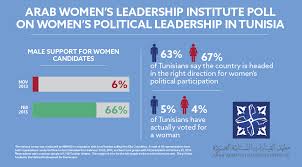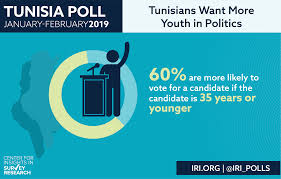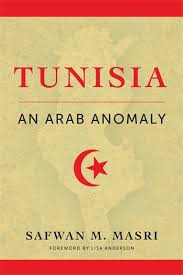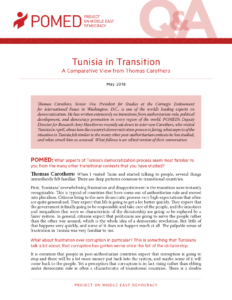 Presidential candidates Selma Elloumi Rekik and Abir Moussi want to fight against creeping fundamentalism that has threatened Tunisian women’s freedoms and improve economic prospects for unemployed youth. Their chances of winning are slim and they’re up against two dozen men for the job. But the race is wide open ahead of the first-round vote Sept. 15, AP reports:
Presidential candidates Selma Elloumi Rekik and Abir Moussi want to fight against creeping fundamentalism that has threatened Tunisian women’s freedoms and improve economic prospects for unemployed youth. Their chances of winning are slim and they’re up against two dozen men for the job. But the race is wide open ahead of the first-round vote Sept. 15, AP reports:
In most Arab countries, women still struggle to secure equal political, legal, economic and marital rights as men. Issues like equal inheritance, the right to have an abortion or the right of a Muslim woman to marry a non-Muslim remain taboos for strictly religious reasons.
Moussi, 44, is known as the “steel lady” for her tenacity and firm opposition to Tunisia’s Islamists, who have become an important political force since the 2011 Arab Spring revolution lifted restrictions on their activities. She wants to push moderate Islamist party Ennahdha out of the political scene and change the constitution to ban parties based on religion, calling political Islam “antithetical to democracy.”
Tunisia’s Defence Minister Abdelkarim Zbidi will amend the constitution if he wins September’s presidential election to end an “unreasonable” division of power between the prime minister and the head of state, he told Reuters, a move rivals oppose:
 The constitution’s shortcomings became clear over the past two years during disagreements between the president and prime minister. However, the possible amendment of a constitution agreed by parliament only five years ago after difficult negotiations between rival parties, could prove divisive. Ennahda, along with some civil society organisations, has rejected the move, saying it is too early to judge a constitution that has not yet been fully implemented.
The constitution’s shortcomings became clear over the past two years during disagreements between the president and prime minister. However, the possible amendment of a constitution agreed by parliament only five years ago after difficult negotiations between rival parties, could prove divisive. Ennahda, along with some civil society organisations, has rejected the move, saying it is too early to judge a constitution that has not yet been fully implemented.
Tunisia’s first freely elected president, Beji Caid Essebsi, was a member of the former regime’s Old Guard who nevertheless helped consolidate Tunisia’s democratic transition, the Project on Middle East Democracy’s Anne Wolf writes for STRATFOR (subscription required).
The United States has agreed to give Tunisia financial aid worth $335 million over five years to support its democratic transition, according to the Tunisian Development and International Cooperation Ministry. The aid will be financed by the US Agency for International Development (USAID), Reuters reports.
“Aid will fund projects that encourage private initiative, create new employment opportunities for young people, and improve governance towards supporting democratic transition”, the ministry said in statement.
The International Republican Institute (IRI) and the National Democratic Institute (NDI) announced today the launch of their joint Election Observation Mission (EOM) for the September 15 presidential and October 6 parliamentary elections in Tunisia. The 2019 presidential and legislative elections mark Tunisia’s fourth round of elections since the 2011 revolution, IRI adds:
 The elections will be held against a backdrop of citizens’ growing unease with the economic situation and disappointment in their political leaders. Repeated polling has shown high unemployment, especially among youth and in the country’s underdeveloped interior regions, and rising inflation are driving resentment toward the government for its inability to improve the lives of ordinary Tunisians. Despite their frustrations with the system, seven million Tunisians – the highest number in Tunisia’s history – are registered to vote and public opinion research conducted by NDI and IRI suggests that many intend to exercise their right to vote in the upcoming elections.
The elections will be held against a backdrop of citizens’ growing unease with the economic situation and disappointment in their political leaders. Repeated polling has shown high unemployment, especially among youth and in the country’s underdeveloped interior regions, and rising inflation are driving resentment toward the government for its inability to improve the lives of ordinary Tunisians. Despite their frustrations with the system, seven million Tunisians – the highest number in Tunisia’s history – are registered to vote and public opinion research conducted by NDI and IRI suggests that many intend to exercise their right to vote in the upcoming elections.
Could this electoral campaign lastingly reshape Tunisia’s political system? The enormous attention on the presidential election risks relegating the parliamentary elections to a secondary event and could affect Tunisia’s semi-presidential system, according to Max Gallien (@MaxGallien), a political scientist at the London School of Economics, and Isabelle Werenfels (@iswerenfelsi). a senior fellow with a special focus on the Maghreb countries at the German Institute of International and Security Affairs (SWP) in Berlin.
 A president without the support of a strong party may advocate for a more presidential system and push for constitutional changes. On the other hand, a president with strong parliamentary backing may have an interest in strengthening parliament, as may be the case with an Ennahda double win, they write for The Post’s Monkey Cage blog.
A president without the support of a strong party may advocate for a more presidential system and push for constitutional changes. On the other hand, a president with strong parliamentary backing may have an interest in strengthening parliament, as may be the case with an Ennahda double win, they write for The Post’s Monkey Cage blog.
“The upcoming presidential and parliamentary elections will be a critical test, not only for democracy in Tunisia, but for democratic reform in the Middle East and North Africa,” said IRI President Dr. Daniel Twining. “
“The citizens of Tunisia will be able to choose from a wide, qualified field of candidates for the September 15 presidential contest and the October 6 parliamentary election,” said Les Campbell, Senior Associate and Director of NDI’s Programs in the Middle East and North Africa.
The mission’s deployment follows an invitation from the High Independent Authority for Elections (ISIE) and builds upon the findings of a pre-election assessment mission that visited Tunisia from July 30 – August 2, 2019 and issued a statement with recommendations for various election stakeholders.

POMED
The IRI-NDI mission to Tunisia will conduct its activities in accordance with the Declaration of Principles for International Election Observation and Code of Conduct for International Election Observer. The observation delegation is supported by the U.S. Agency for International Development (USAID).
NDI’s Work in Tunisia: Since 2000, NDI has supported Tunisian democrats in their efforts to promote a more inclusive and participatory political environment. IRI’s Work in Tunisia: Since the January 2011 revolution that ended decades of authoritarian rule, IRI has supported Tunisia’s democratic transition by bolstering a more responsive political process and helping to strengthen democratic governance throughout the region.
IRI & NDI are core institutes of the National Endowment for Democracy.







